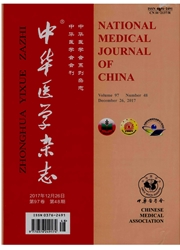

 中文摘要:
中文摘要:
目的 分析不同含铂双药方案对晚期非小细胞肺癌(NSCLC)患者的疗效及不良反应.方法 以第三军医大学新桥医院呼吸内科2011年1月至2012年12月收治的239例晚期NSCLC患者为研究对象,回顾性分析并比较铂剂分别联合应用紫杉醇(紫杉醇组,113例)、吉西他滨(吉西他滨组,72例)、多西他赛(多西他赛组,54例)的3种方案对患者进行一线治疗的效果及不良反应.采用χ2检验分析疗效及不良反应,采用Kaplan-Meier法进行生存分析.结果 3组患者的客观缓解率分别为42.5%、43.1%、35.2%(P=0.612),疾病控制率分别为84.1%、75.0%、74.1%(P=0.198);中位无进展生存期分别为5.6、5.8、3.2个月(P=0.000).不良反应主要为骨髓抑制、胃肠道反应、脱发和神经毒性等.3种方案神经毒性发生率分别为34.5%(39/113)、11.1%(8/72)、18.5%(10/54)(P=0.001),其余不良反应发生率差异均无统计学意义(均P〉0.05).结论 3种含铂方案治疗晚期NSCLC患者均有较好疗效,不良反应可耐受,近期疗效相似;在降低疾病进展风险方面,紫杉醇、吉西他滨方案优于多西他赛方案.
 英文摘要:
英文摘要:
Objective To explore the efficacies and toxicities of different platinum-based combination chemotherapeutic regiments for patients with advanced non-small cell lung cancer (NSCLC). Methods A total of 239 advanced NSCLC from January 2011 to December 2012 were reviewed in Xinqiao Hospital. The chemotherapeutic efficacies and adverse effects in the first-line treatment of advanced NSCLC by paclitaxel plus platinum ( paclitaxel group, n = 113 ), gemcitabine plus platinum ( gemcitabine group, n = 72) and docetaxel plus platinum (docetaxel group, n -'--54 ) regiments were retrospectively analyzed and compared. Their efficacies and toxicities were analyzed by Chi-square test. And survival was estimated with Kaplan-Meier method. Results The objective response rate (ORR) of three groups were 42. 5 % ,43.1% and 35.2% respectively (P = 0. 612). The disease control rate (DCR) were 84. 1%, 75.0% and 74. 1% respectively (P = 0. 198). The median progression-free survival was 5.6,5.8 and 3.2 months respectively (P = 0. 000 ) . The major adverse effects were myelosuppression, gastrointestinal reaction, alopecia and neurotoxicity,etc. The incidence rate of neurotoxicity among three groups were 34. 5% (39/113), 11.1% (8/72) and 18.5% (10/54) respectively (P = 0. 001 ). No significant inter-group difference of adverse effects existed ( all P 〉 0. 05 ), except for neurotoxicity. Conclusions Three platinum-based combination chemotherapeutic regiments produce excellent efficacies with acceptable adverse effects. Their ORR and DCR were similar. And the median progression-free survival of paclitaxel and gemcitabine groups is significantly longer than that of docetaxel group.
 同期刊论文项目
同期刊论文项目
 同项目期刊论文
同项目期刊论文
 期刊信息
期刊信息
